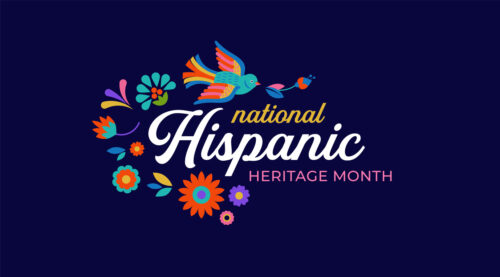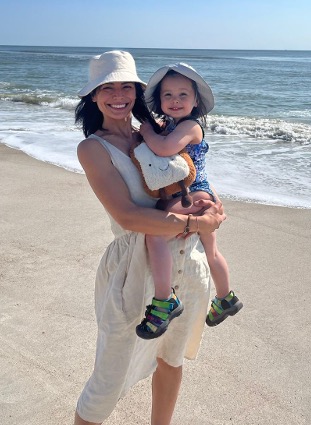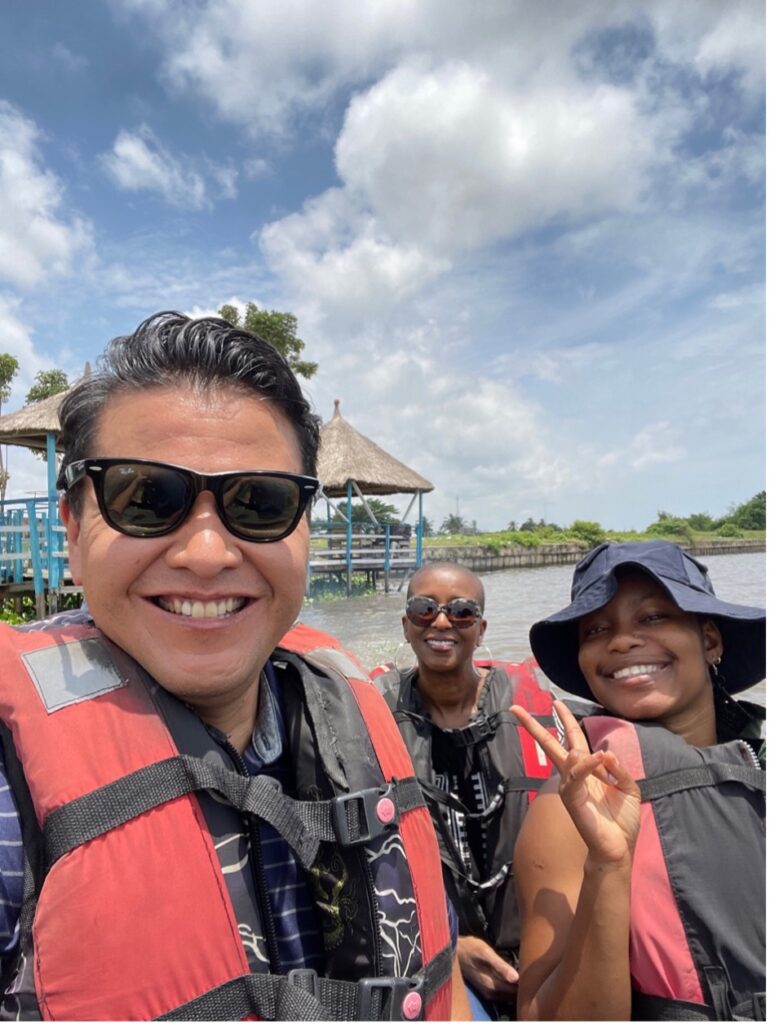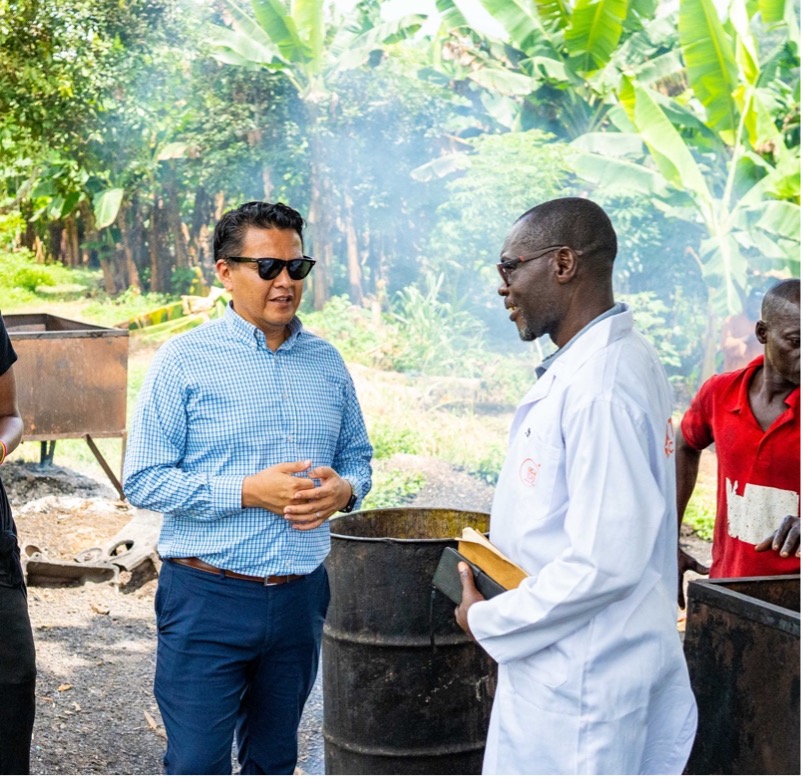
Celebrating Hispanic/Latine Heritage Month at RMI
Two RMIers reflect on their Hispanic backgrounds and how it drives their commitment to the clean energy transition.
Hispanic Heritage Month runs September 15 to October 15 in the United States. The month offers a time to reflect on the contributions of America’s roughly 63 million Hispanic (or Latine) residents, as well as the many generations that have come before them.
What do we mean when we say Latine?
Latine is a gender-neutral term that refers to people of Latin American or Caribbean descent. It is a non-binary alternative to the terms Latino or Latina and originated in Spanish-speaking countries. While the term Hispanic refers to people who are descended from Spanish-speaking populations, Latine can be considered more inclusive to describe people from or descended from Latin America.
The effects of climate change are all too real for the Latine population. In a 2023 Pew Research Center poll, more than half of respondents reported living in an area that had experienced an extreme weather event. Another Pew poll found that 81 percent of Hispanics view climate change as a personal priority.
Climate change and the overheating world also have an outsize impact on farmworkers, who must work outdoors and brave the stifling summer heat. More than 80 percent of US farmworkers are Latine, making our warming world an urgent health problem for this community. And almost two million Latines live within a half mile of oil and gas facilities, giving them outsize exposure to pollution — another reason why we must accelerate the transition to clean energy.
At RMI, we are proud of our diversity and the unique backgrounds of our staff. We spoke with two RMIers who share Latine heritage to learn more about what drives them, and how their identity relates to their work in bringing clean energy to all.
Estefanía Marchán

Estefanía Marchán in West Virginia with her dog, Khala.
An expert in RMI’s Center for Climate-Aligned Finance, Estefanía Marchán leads a team that is helping financial institutions achieve with international climate goals and enabling the transition of hard-to-abate and high-emitting sectors.
Although born in the Los Angeles area, Marchán’s family returned to Ecuador with her while she was still a baby, giving her a childhood that has helped her to engage both the developing and developed world. “I feel like I can really understand both sides. And I also feel a deep pull towards supporting developing countries.”
That drive led her earlier in her career to the Inter-American Development Bank, where she worked on issues such as poverty alleviation and sustainability. “What I quickly saw was that in the developing world, there’s so much that government has to do,” she says.” But I wanted to get a better sense of what the private sector could do when the government fails.”
That desire to work alongside private sector actors led her to RMI — and again between multiple worlds: nonprofit, government, and the private sector. “I feel like it’s made me pragmatic about how to look for potential solutions. I’m not surprised when the private sector or governments say: ‘this is hard we can’t do this,’” Marchán laughs, “Right! Because it is hard!”
Her background has helped Marchán see more clearly the stakes of the energy transition and embrace a sense of pragmatism, especially at a time when many developing nations are still dependent on fossil fuels. “I’m from Ecuador, that’s an oil economy. That means the people that live there live or die because of the price of oil. I don’t have a bias against someone thinking it’s going to be hard to transition off of oil,” she says. “It’s not the oil they are protecting, it’s how it affects people — their jobs and important things like that.”
I’m from Ecuador, that’s an oil economy. That means the people that live there live or die because of the price of oil.
Her background means she is not shy when it comes to speaking with actors that others might avoid, and recognizes the ambition needed to tackle global climate pollution. “I have less of a bias in thinking this is bad or that is bad. I want to work with you no matter what,” Marchán says. “I can work with you if you’re a high emitter — I want to work with you if you’re a high emitter.

Estefanía with her daughter, on Amelia Island, Florida.
Having moved to the Atlanta area, after a decade in Washington D.C., Marchán has been living firsthand with the effects of climate change, as Hurricane Helene tore through the region. It reminded her of why she joined RMI in the first place. “It felt to me that RMI was wanting to … do the best quality work, that it attracts very bright, very hardworking, and enthusiastic people.”
In the course of her work at RMI, she draws energy from the reactions she receives from the other side of the table, citing the praise RMI gets. “With everything we’ve ever done, what we hear is: ‘You guys are doing good work, you guys are a breath of fresh air. You guys are trying to find real solutions’,” Marchán says. “So we’re both doing the activism work in the sense that we’re maintaining a high level of climate ambition but we are also doing the practical work, rolling up our sleeves and getting into the weeds of an issue.”
Having risen through the organization from senior associate and now a principal, Marchán is aware of the value of her voice as a Hispanic leader and has been impressed by how RMI’s recruiting efforts make diversity a priority. For Marchán it speaks to the overall culture within RMI. “Naturally the people that we attract, they’re the open-minded kind,” Marchán says. “I have never felt anything other than totally accepted.”
Octavio “Tavo” Fuentes
As RMI’s Chief Technology & Operations Officer, Octavio “Tavo” Fuentes keeps RMI’s 600 employees connected and able to share knowledge and drive solutions across continents.

Octavio “Tavo” Fuentes with his RMI colleagues.
Desert ecosystems have been a part of Fuentes wherever life has taken him. From his early years in San Diego, California, to his family’s roots in the Mexican state of Sonora, to Arizona where he now calls home. That comfort with and knowledge of these dry — but not barren — areas equipped him well for Department of Defense contractor work in Iraq, Afghanistan, and the United Arab Emirates. He remains attuned to the issues that affect any desert inhabitant: fresh water — and the life of the surrounding terrain in a time of climate change.
“Our summers keep getting hotter,” Fuentes says. “The seasonal monsoons don’t happen as often, and the beautiful Saguaro cactus that lines our deserts continues to migrate north because they’re dying off from the heat in places where they have stood for hundreds of years. The landscape is screaming out for help.”
Fuentes also knows firsthand the human toll an increasingly inhospitable desert climate can take. In his earlier life working for immigrant rights, Fuentes would search for migrants who had made the perilous journey across the Arizona desert, only to find too many had succumbed to the heat. Over the course of decades, Fuentes has witnessed the desert only get hotter: “As the climate changes — these are climate migrants, these are climate refugees.”
Fuentes’s passion eventually brought him to RMI, where he is energized by a mission that thinks globally. “When this opportunity with RMI came up I thought, this is exactly where I need to be. To practice my values and my hopes for the world, because we’re going to be part of the solution or we’re not,” Fuentes says.
This is exactly where I need to be. To practice my values and my hopes for the world, because we’re going to be part of the solution or we’re not.
The impact of RMI’s work was underlined for Fuentes on a recent trip to Nigeria, where he was able to observe an RMI project bringing solar power to rural areas. On his journey into rural Nigeria, he saw echoes of the towns and villages of Mexico. “The small towns looked so familiar — and then seeing the impact and transformation that our Nigeria team is making in the lives of people, I realized we are making the kind of impact that is affecting the lives of all human beings across the world.” Fuentes says.

Fuentes speaks with staff at a palm farm on a recent visit to Nigeria.
Fuentes is aware of his roots, and the contradictions that arise. “There’s a phrase in Spanish: ni de aquí – ni de allá, neither from here nor there. It’s an interesting middle space that Mexican Americans experience,” Fuentes says. But he takes solace in his ancestors: Fuentes can trace his roots to the Indigenous Opata people who made their home in present-day Sonora, thousands of years ago. “We have been part of this desert for millennia,” he adds. “It has always been this beautiful thing of finding refuge in the homeland, always feeling like we’re part of the land.”
But the land has not always been welcoming to Fuentes. In Arizona, which has served as ground zero for increasingly anti-immigrant and racist rhetoric, Fuentes has not emerged unscathed. He speaks of being asked to produce papers by border patrol in a US city, and having guns pointed at him by local militia. “Being asked to present your legal ability to be in this country — when you were born here, you’ve served in the military, you’ve been in war zones for the US government — it really messes around with you.”

Fuentes at his daughter’s college commencement ceremony.
But Fuentes, a keen student of mindfulness and Buddhist philosophy, has made an effort to calm his mind and rise above. “It comes from somewhere. They’re not born with that kind of hate in their heart,” Fuentes says. “We need to offer grace to each other and just have a sense of openness to people that are different, even in politically charged conversations like the ones that we’re living in. We have many unskillful conversations. We rarely have any skillful ones where we find common ground.”
But he also finds time for the joy that his culture prizes, the work ethic that drives him, and the knowledge of his origins that keep him grounded. “Learning more about my indigenous ancestry has been very empowering. And recognizing that my people have been here for as long as humans have been in the Americas has really helped to center my identity,” he says. “I’ve always been here, my people have always been here. We always will be.”